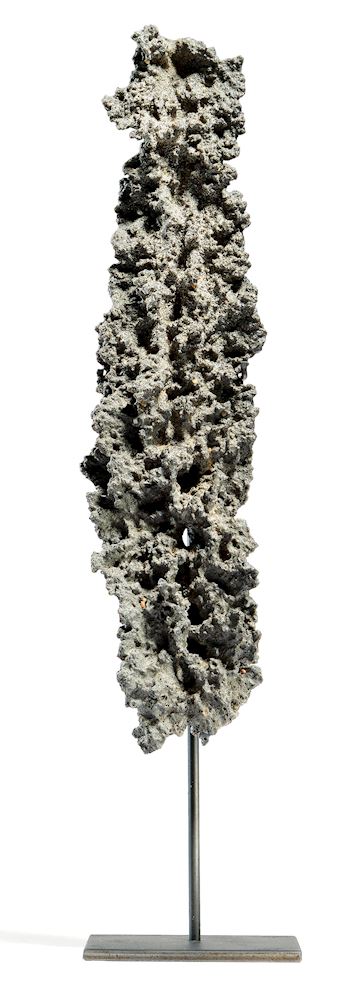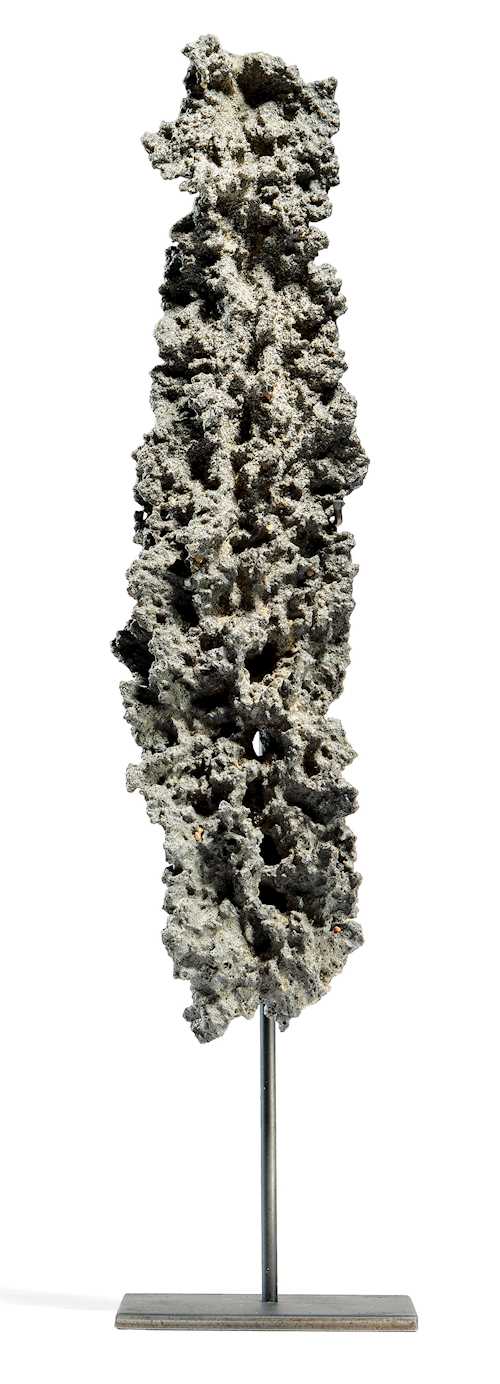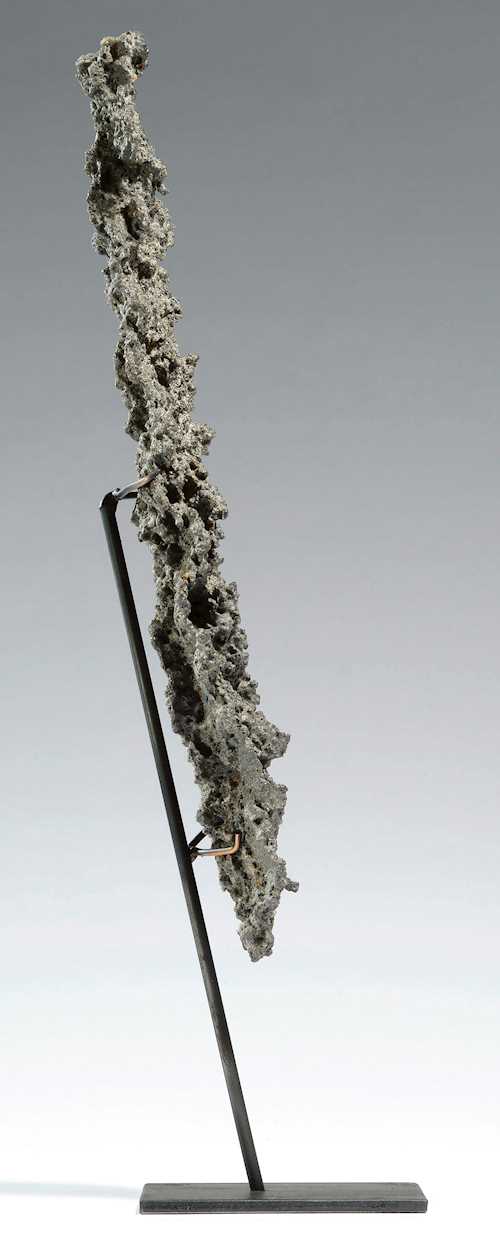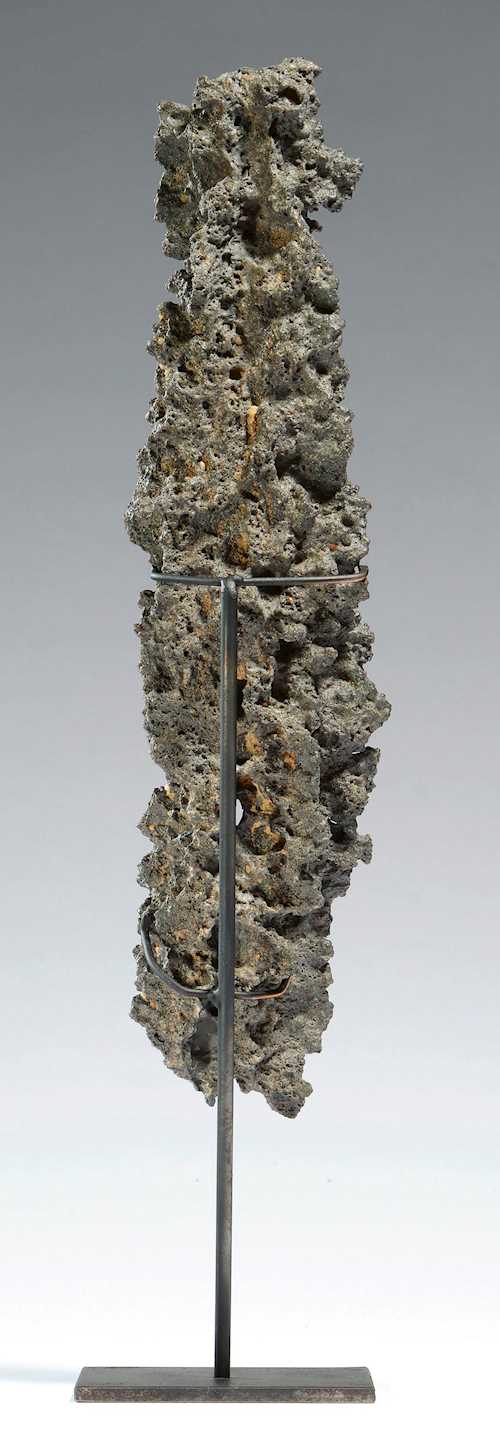
Lot 805* - A207 Out of This World - Monday, 04. December 2023, 04.00 PM
FULGURITE
Glass (silica)
Egypt, Western Desert
32 × 8 × 4 cm (not including stand)
Egypt, Western Desert
32 × 8 × 4 cm (not including stand)
Provenance: Swiss private collection
Fulgurites are also called ‘fossilized lightning’ because they are formed when lightning strikes the ground. They are, so to speak, ‘lightning turned to stone’. In the process, tube-like structures are formed, hollow on the inside and branching out at the ends. Due to the great energy of the impact, material is ejected from the inside of the resulting cylinder, thus forming the hollow cavity. Rocks and sand of any type can form fulgurites.
So-called ‘lightning bundles’ already served in the art of the Romans and Greeks as a symbol for the god of the heavens, who slung lightning bolts and ruled over gods and men. Both in appearance and in the manner in which they originated, fulgurites could be described as the natural equivalent of these symbols, which are usually carved from stone and consist of stylised lightning bolts, held by Zeus himself in statues made in his honour.
The fossilisation of lightning occurs so rarely that fulgurites were given as gifts to kings, such as Frederick Augustus of Saxony in 1822. The Leipzig professor of physics and chemistry L. W. Gilbert remarked around 1800 that he considered fulgurites as ‘by far the most interesting and greatest natural curiosity.’ Due to the exceptionally high temperatures created in the rock by the striking lightning, another highly interesting scientific feature of fulgurites is the presence of very rare minerals such as lechatelierite, a natural silica glass composed of amorphous silica. This mineral otherwise only occurs in impact craters and tectonically highly fractured rocks (mylonite).
The specimen presented here was found at the foot of sand dunes of the great sand sea in the Western Desert of Egypt. Its tubular shape is typical of lightning striking sand. Since fulgurites can usually only be excavated in fragments of 10-15 centimetres in length, this specimen is a true rarity due to its size. With its dark colour and detailed filigree branching, it is a mysterious, fascinating product of an extraordinary natural phenomenon.
Fulgurites are also called ‘fossilized lightning’ because they are formed when lightning strikes the ground. They are, so to speak, ‘lightning turned to stone’. In the process, tube-like structures are formed, hollow on the inside and branching out at the ends. Due to the great energy of the impact, material is ejected from the inside of the resulting cylinder, thus forming the hollow cavity. Rocks and sand of any type can form fulgurites.
So-called ‘lightning bundles’ already served in the art of the Romans and Greeks as a symbol for the god of the heavens, who slung lightning bolts and ruled over gods and men. Both in appearance and in the manner in which they originated, fulgurites could be described as the natural equivalent of these symbols, which are usually carved from stone and consist of stylised lightning bolts, held by Zeus himself in statues made in his honour.
The fossilisation of lightning occurs so rarely that fulgurites were given as gifts to kings, such as Frederick Augustus of Saxony in 1822. The Leipzig professor of physics and chemistry L. W. Gilbert remarked around 1800 that he considered fulgurites as ‘by far the most interesting and greatest natural curiosity.’ Due to the exceptionally high temperatures created in the rock by the striking lightning, another highly interesting scientific feature of fulgurites is the presence of very rare minerals such as lechatelierite, a natural silica glass composed of amorphous silica. This mineral otherwise only occurs in impact craters and tectonically highly fractured rocks (mylonite).
The specimen presented here was found at the foot of sand dunes of the great sand sea in the Western Desert of Egypt. Its tubular shape is typical of lightning striking sand. Since fulgurites can usually only be excavated in fragments of 10-15 centimetres in length, this specimen is a true rarity due to its size. With its dark colour and detailed filigree branching, it is a mysterious, fascinating product of an extraordinary natural phenomenon.
To see this Object in a Video, click here
CHF 4 500 / 6 000 | (€ 4 640 / 6 190)
Sold for CHF 8 125 (including buyer’s premium)
All information is subject to change.



